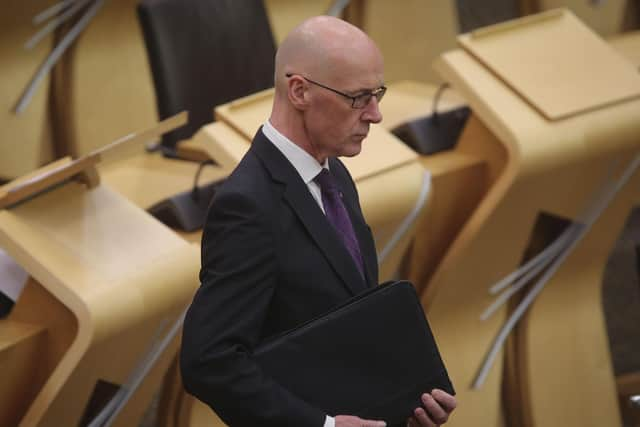Big challenges lay ahead for Scottish finances as John Swinney announces fresh cuts
Cuts worth £500 million and changes to spending were announced by the stand-in finance secretary while, outside, the heavens opened.
The figures are stark in the challenge they outline.
Nearly £40m in cuts to staff alone demonstrates the pain is not just monetary, with many public bodies and the government itself implementing a recruitment freeze.
Advertisement
Hide AdAdvertisement
Hide AdRisks have also been taken on programme uptake, such as concessionary fares.
The big questions remain unanswered. Will the Scottish budget be helped or hampered by the yet-to-be-outlined plans from Liz Truss?
We can expect more detail following her decisions in the Scottish Government’s own emergency budget, promised within two weeks of a ‘fiscal event’ in Westminster.


Looking further forward, the 2023/24 budget will have both a Truss government and a full-on economic crisis to deal with.
The Scottish Government will be kidding themselves if they don’t plan for another year of increased pay demands from the public sector, cries for more funding from local government, and the annual plea for additional cash for long-suffering services. That, plus deferred spending pain from this year, could make for painful options. The choice will then be whether the Scottish Government chooses to raise income taxes – a penny rise would see around £500m extra in revenue – or stick to its guns.
A genuine tax-cutting PM could make that decision much harder, but there is also room for the first imaginative use of tax powers since the 2014 referendum.
Beware also the spin of the opposition.
As tantalising it may be to attack the finance secretary for not cutting the planned £20m budget for an independence referendum, that money is not included in this year’s budget, instead forming part of the planning spending for 2023/24.
When the finance secretary stands up to announce the budget in December and is forced to choose between £20m for indyref2 or £20m extra for additional cost of living help is when that argument will really bite. Government is, after all, all about choices.
All episodes of the brand new limited series podcast, How to be an independent country: Scotland’s Choices, are out now.
It is available wherever you get your podcasts, including Apple Podcasts and Spotify.
Comments
Want to join the conversation? Please or to comment on this article.

